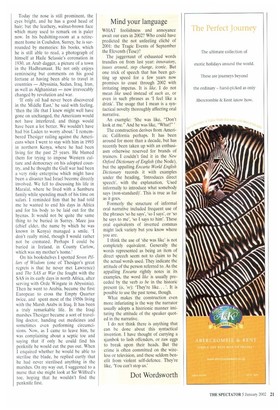Mind your language
WHAT foolishness and annoyance await our ears in 2002? Who could have predicted the not unfeeling cliché of 2001: the Tragic Events of September the Eleventh (Tese)?
The juggernaut of exhausted words trundles on from last year: innovatory,
issues around, step change, iconic. But one trick of speech that has been getting up speed for a few years now promises to coast through 2002 with irritating impetus. It is like. I do not mean like used instead of such as, or even in such phrases as `I feel like a drink'. The usage that I mean is a syntactical novelty thoroughly affecting oral narrative.
An example: 'She was like, "Don't look at me," And he was like, "What!"' The construction derives from America; California perhaps. It has been around for more than a decade, but has recently been taken up with an enthusiasm otherwise reserved for brands of trainers. I couldn't find it in the New Oxford Dictionary of English (the Node), but the appalling Encarta World English Dictionary records it with examples under the heading, 'Introduces direct speech', with the explanation, 'Used informally to introduce what somebody says (non-standard)'. This is true as far as it goes.
Formerly the structure of informal oral narrative included frequent use of the phrases 'so he says', `so I says', or 'so he says to me', 'so I says to him'. These oral equivalents of inverted commas might lack variety but you know where you are.
I think the use of 'she was like' is not completely equivalent. Generally the words represented as being an item of direct speech seem not to claim to be the actual words used. They indicate the attitude of the person referred to. As the appalling Encarta rightly notes in its examples, the word like is usually preceded by the verb to be in the historic present (is, 're): 'They're like.. . It is possible to use the past tense, though.
What makes the construction even more infuriating is the way the narrator usually adopts a histrionic manner imitating the attitude of the speaker quoted in the narrative.
I do not think there is anything that can be done about this syntactical invention. I have thought of carrying a sjarnbok to lash offenders, or raw eggs to break upon their heads. But the crime is often committed on the wireless or television, and these seldom benefit from violent self-defence. They're like, 'You can't stop us.'
Dot Wordsworth






















































 Previous page
Previous page